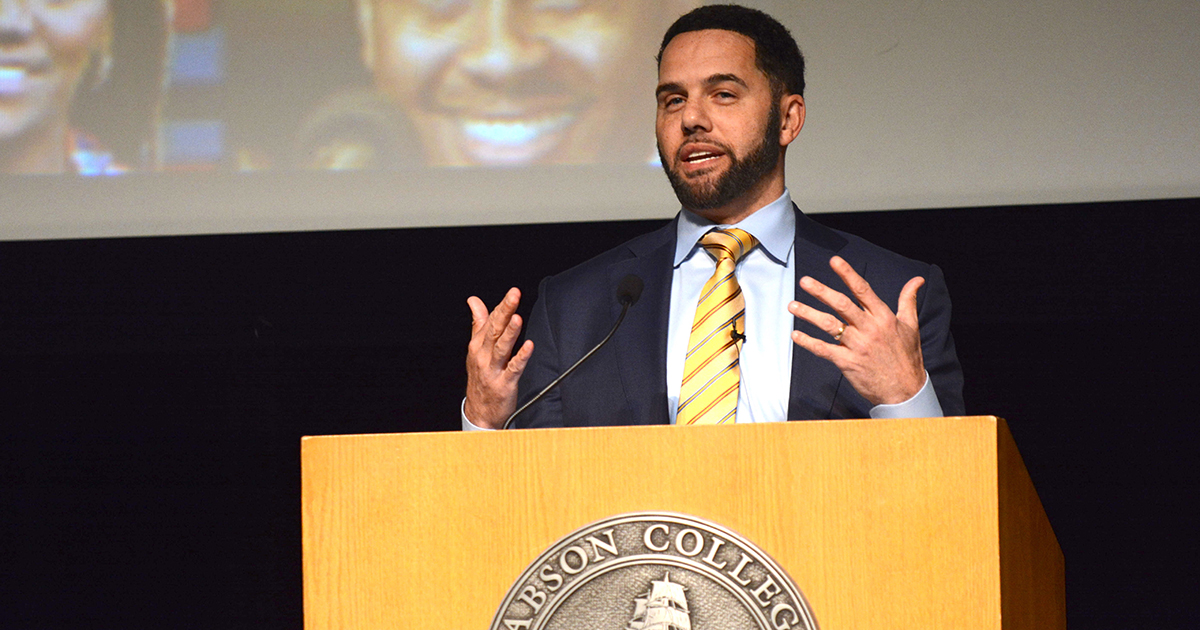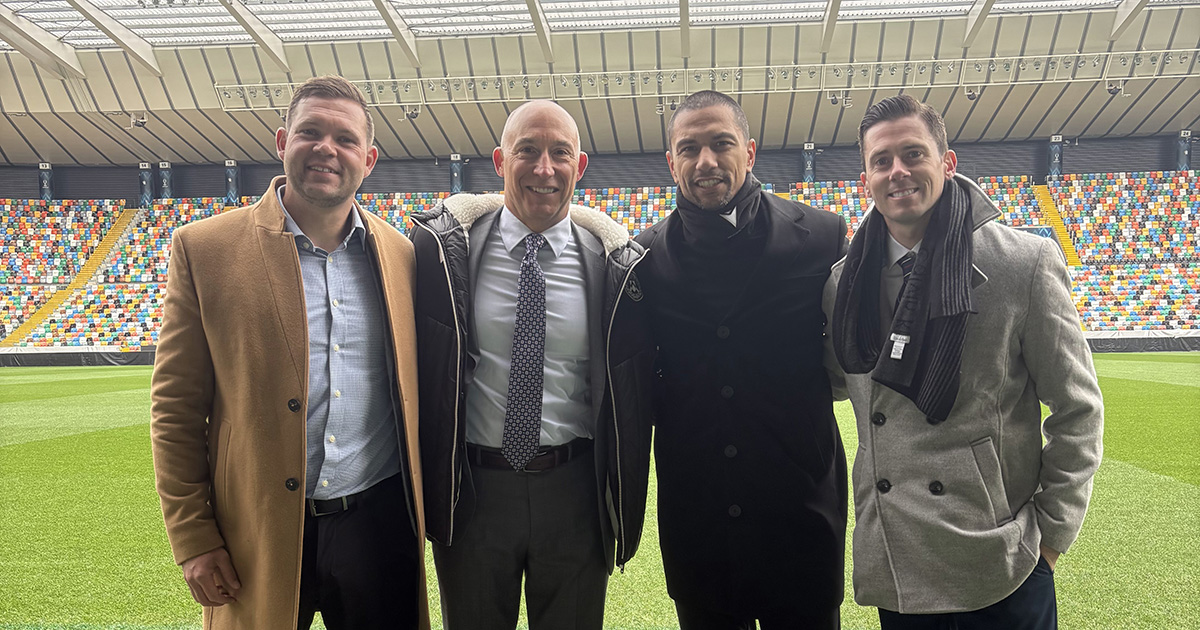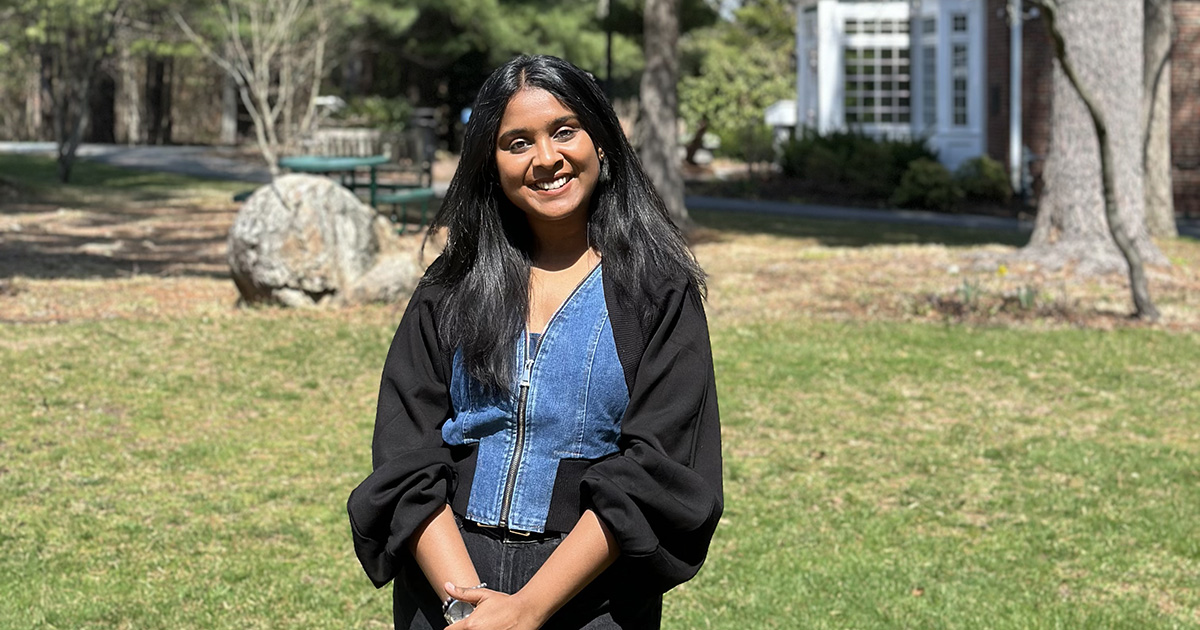At MLK Jr. Legacy Day, a Call to Guide Others

Too often, people are judged by their appearance or because of where they grew up, shared Steve Pemberton—once a third-generation orphan, now an established business leader and author.
“We think we know someone’s story just by a casual glance,” Pemberton said. “We all have a story, but none of us actually look like that story.”
Pemberton’s story includes many foster homes and challenges, but eventually finds its way to some important grade school educators turned role models.
Harping on the importance of role models as “human lighthouses,” or the “everyday heroes that show up in life,” Pemberton invited students to change the world and to become role models themselves during Babson’s 17th annual Martin Luther King Jr. Legacy Day.
A Human Lighthouse
Similar to their namesake, these human lighthouses, Pemberton said, are there to direct, correct, and protect the journey of the many.
Pemberton’s teachers and other role models, he shared, pushed him to utilize his best ability.
“They’re the real heroes of my story,” he said. “In many ways, I consider them to be the personification of Martin Luther King’s dream but also his doing. They were trying to better society, and they saw in me a way to do that.”
Pemberton cited King’s goal of reaching internal consistency and said the United States suffers from much of the same complications today as it did then.
Speaking to the civil rights movement and the goals of Martin Luther King Jr., Pemberton said King’s “real point was that America was falling far short of its ideals. As long as there was racism, and bigotry, and unapologetic hatred, that was always going to be the case,” Pemberton said. “That was true then, and it’s true now.”
Much like the way Entrepreneurial Thought & Action is taught at Babson College, Pemberton called for action.
“King was far more of a doer than he was a dreamer. Dreams are important and necessary. But for all of their promise, dreams are still a passive thing. They still ask that you wait. We’re living in a time where we have to stop dreaming, and we have to start doing.
“There’s no better place to do that than here at Babson, where this will be, for you, a lot like family.”
Babson Students Driving Change
Wes Woodson ’20, Melissa Denizard ’21, and Gioia de la Feld ’21 were honored with Martin Luther King Jr. Creativity Prizes. Woodson, who submitted a series of letters between his current and younger self, shared with the crowd: “When I think back to when I was younger, I never felt I belonged. … It is my intention to remind people you belong.”
Sienzhi Kouemo ’20 and Zahira Perez ’20 received the Martin Luther King Jr. student leadership awards, while Donna Stoddard, associate professor and chair of the Technology, Operations, and Information Management (TOIM) Division, received the faculty leadership award. Larinda Cole, Associate Director for Hoffman Family Undergraduate Center for Career Development, was presented with the staff leadership award.
A longtime proponent of diversity and inclusion at his own company, Aaron Walton ’83 was presented with the inaugural alumni leadership award in a moment he illustrated as a tremendous honor and one he wouldn’t forget.
“Sons of color today face a massive, growing divide, but I remain inspired by what I perceive to be King’s entrepreneurial legacy,” Walton said. “He identified a need, he developed solutions, he took risks, and made a difference to everybody.”
Director of Multicultural and Identity Programs Patrick Hale said Martin Luther King Jr. Legacy Day advances Babson’s engagement in meaningful conversations about the visions of justice, equity, and peace articulated by civil rights leaders, and “provides the Babson community with a chance to remember, reflect upon, and celebrate the legacy of Martin Luther King Jr.”
Vice President for Student Affairs and Dean of Students Larry Ward said the entire Babson community is made stronger by its differences.
“Dr. King championed and ultimately gave his life and service to the principles of peace, justice, and equality. In a diverse community like Babson, we have a fundamental responsibility to respect each other. We’re here not only to celebrate, but to remember, to learn.”
President Stephen Spinelli Jr. MBA’92, PhD said diversity, equality, and inclusion are all integral parts of the backbone of the upcoming strategic plan.
“Dr. King utilized his education to change the world, and give voice to the needs of many,” Spinelli said. “Today, he continues to inspire future generations for a just society.”
Posted in Community




